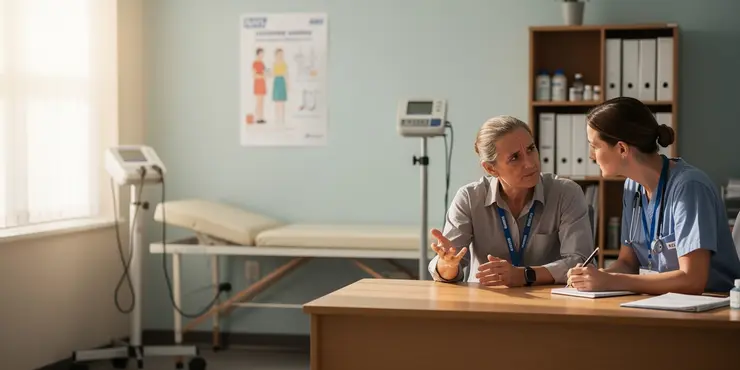
Find Help
More Items From Ergsy search
-
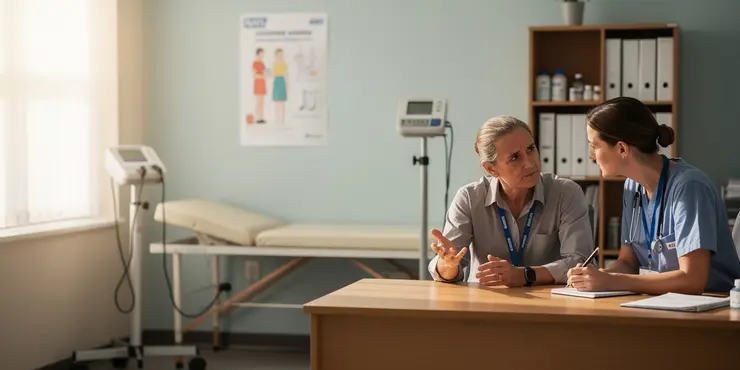
How is Alzheimer's disease diagnosed?
Relevance: 100%
-

What is Alzheimer's disease?
Relevance: 99%
-

What are the symptoms of Alzheimer's disease?
Relevance: 89%
-

How common is Alzheimer's disease in the UK?
Relevance: 88%
-

What causes Alzheimer's disease?
Relevance: 88%
-

What are the stages of Alzheimer's disease?
Relevance: 88%
-

Can Alzheimer's disease be prevented?
Relevance: 86%
-

What treatments are available for Alzheimer's disease?
Relevance: 86%
-
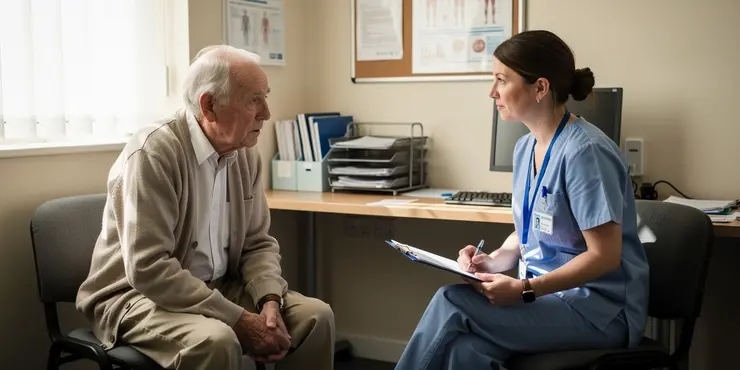
Who is at risk of developing Alzheimer's disease?
Relevance: 85%
-
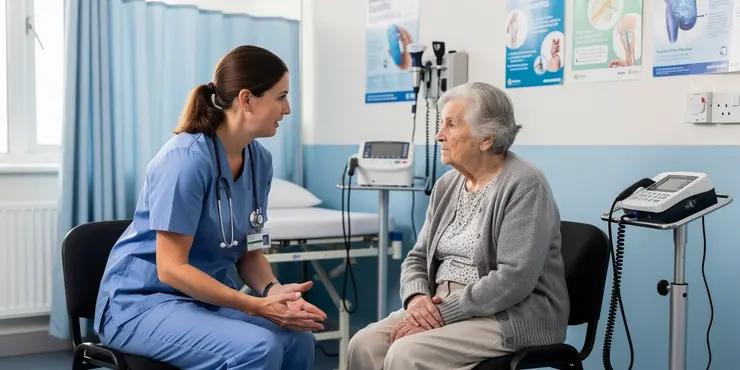
What role does genetics play in Alzheimer's disease?
Relevance: 84%
-

Where can I find information about Alzheimer's disease for carers?
Relevance: 79%
-

How can carers plan for future stages of Alzheimer's disease?
Relevance: 75%
-

Can technology aid in the care of Alzheimer's patients?
Relevance: 67%
-

How does Alzheimer's affect daily life?
Relevance: 65%
-

What support is available for carers of Alzheimer's patients?
Relevance: 63%
-
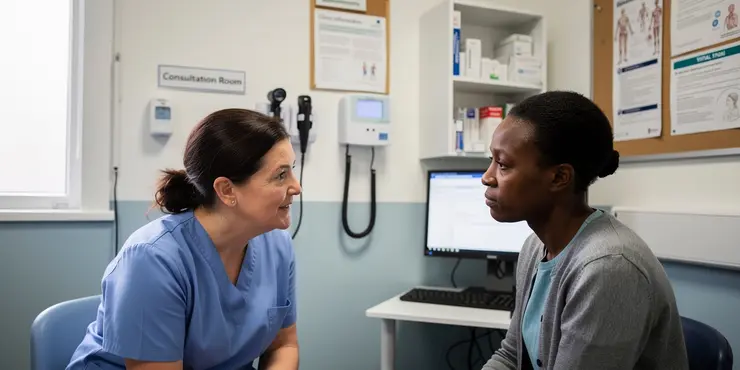
What is the life expectancy after a motor neurone disease diagnosis?
Relevance: 58%
-

How can families support a loved one with Alzheimer's?
Relevance: 57%
-

What online communities exist for carers of people with Alzheimer's?
Relevance: 57%
-

Are there any lifestyle changes that can help reduce the risk of Alzheimer's?
Relevance: 56%
-

What transportation services are available for Alzheimer's patients and their carers?
Relevance: 56%
-

What types of support are available for carers of Alzheimer's patients?
Relevance: 55%
-

How important is self-care for carers of Alzheimer's patients?
Relevance: 55%
-
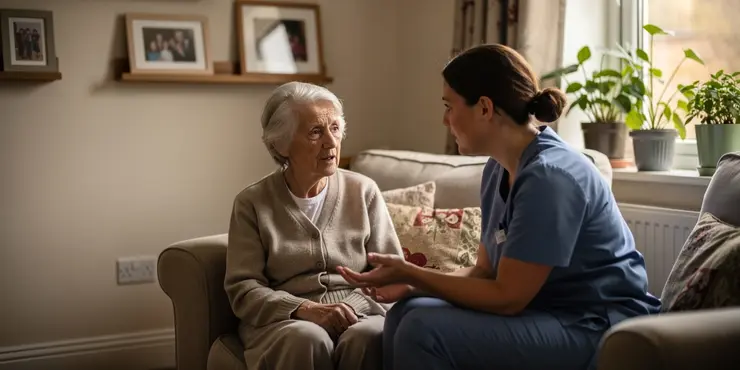
Are there specific apps or tools to help carers of Alzheimer's patients?
Relevance: 55%
-

Are there financial support programs for carers of Alzheimer's patients?
Relevance: 53%
-

What emotional support is available for carers of Alzheimer's patients?
Relevance: 53%
-

Can carers of Alzheimer's patients access in-home healthcare services?
Relevance: 53%
-

How can support groups benefit carers of Alzheimer's patients?
Relevance: 52%
-

What government assistance is available for carers of Alzheimer's patients?
Relevance: 51%
-

What legal resources are available for carers of Alzheimer's patients?
Relevance: 49%
-
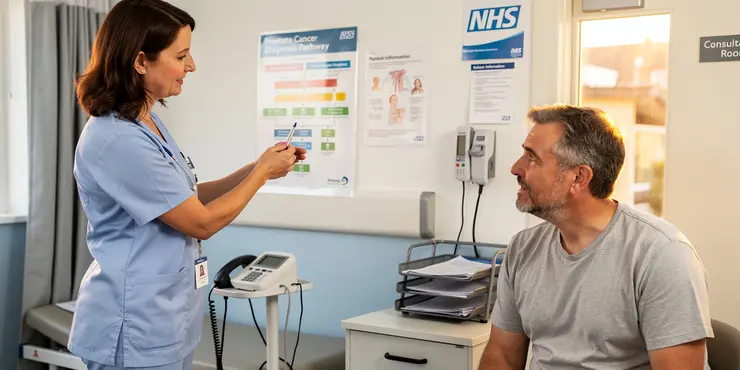
Prostate cancer diagnosis and tests
Relevance: 47%
-

How is Huntington's disease diagnosed?
Relevance: 46%
-

BSL - Diagnosis of panic disorder
Relevance: 45%
-
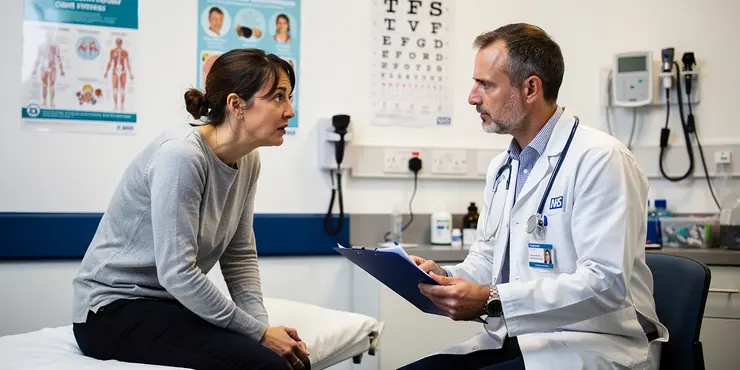
How is flesh-eating disease diagnosed?
Relevance: 45%
-

What is the finger prick blood test for Alzheimers?
Relevance: 43%
-

How is sickle cell disease diagnosed?
Relevance: 43%
-

Head and Neck Cancer Diagnosis
Relevance: 43%
-
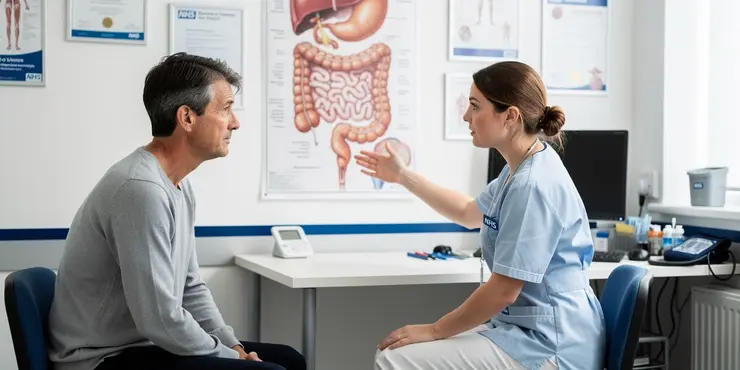
How is Crohn's disease diagnosed?
Relevance: 43%
-
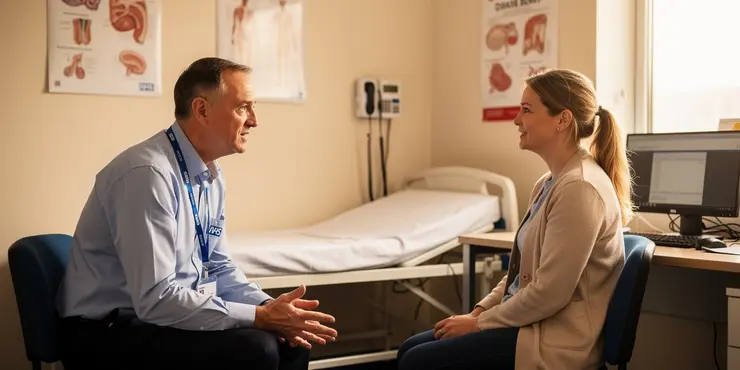
How is motor neurone disease diagnosed?
Relevance: 42%
-

Coeliac disease
Relevance: 42%
-

BSL - Diagnosis of obsessive compulsive disorder (OCD)
Relevance: 42%
Diagnosing Alzheimer's Disease in the United Kingdom
Alzheimer's disease is a progressive neurological disorder that primarily affects memory and cognitive functions, making early diagnosis crucial. Diagnosing Alzheimer's involves a detailed process to rule out other conditions and ensure accurate results. Here, we explore the methods utilized in the United Kingdom to diagnose this condition effectively.
Initial Evaluation and Medical History
The diagnostic process for Alzheimer's typically begins with a comprehensive evaluation by a general practitioner (GP). This involves reviewing the patient's medical history and family background, assessing any signs of memory loss, changes in personality, or other cognitive difficulties. Patients are encouraged to take a family member or close friend to provide additional insights into any changes in behavior or memory.
Cognitive Testing
Cognitive tests, such as the Mini-Mental State Examination (MMSE) or the Montreal Cognitive Assessment (MoCA), are frequently used tools. These tests evaluate various cognitive abilities, such as memory, attention, language, and problem-solving skills. The results help to determine the presence and extent of cognitive impairment, offering clues to the underlying problem.
Brain Imaging
Brain imaging is a significant aspect of diagnosing Alzheimer's disease. Techniques like magnetic resonance imaging (MRI) and computed tomography (CT) scans are employed to view structural changes in the brain. These images help to rule out other conditions like strokes or tumours and can reveal brain atrophy associated with Alzheimer's. Additionally, positron emission tomography (PET) scans might be used to detect abnormal protein deposits indicative of Alzheimer's.
Laboratory Tests
Laboratory tests, including blood tests, are conducted to rule out other causes of dementia-like symptoms, such as thyroid disorders or vitamin deficiencies. While no blood test can currently diagnose Alzheimer's directly, they help ensure that all other potential conditions are considered.
Specialist Evaluation
Upon referral from a GP, a specialist such as a neurologist, psychiatrist, or geriatrician will conduct a more detailed assessment. This evaluation might include more complex neuropsychological testing to examine cognitive abilities in greater detail. Specialists will use all gathered data to confirm an Alzheimer's diagnosis and develop a tailored treatment strategy.
Conclusion
Diagnosing Alzheimer's disease requires a multi-faceted approach to differentiate it from other memory disorders and mental health issues. In the UK, the diagnostic process involves initial assessments with GPs, cognitive testing, brain imaging, lab tests, and evaluations by specialists. Early diagnosis is vital for managing symptoms and planning future care, emphasizing the importance of addressing memory concerns promptly.
Diagnosing Alzheimer's Disease in the United Kingdom
Alzheimer's disease is a brain illness that makes it hard for people to remember things and think clearly. It is important to find out if someone has Alzheimer's early. Doctors in the UK use several steps to check if someone has this illness.
Initial Evaluation and Medical History
First, a doctor called a GP will check the person. The GP will ask about the person's health, family, and if they forget things or act differently. It helps if a family member or friend comes along to tell the GP about any changes they have noticed.
Cognitive Testing
The GP may use special tests to see how well a person can think. These tests ask questions to check memory, attention, and problem-solving. Two tests often used are the Mini-Mental State Examination (MMSE) and the Montreal Cognitive Assessment (MoCA). The test results show if there are any thinking problems and help find out what might be wrong.
Brain Imaging
Doctors can also look at pictures of the brain to learn more. They might use machines like MRI or CT scanners to take pictures of the brain. These pictures show if there are other problems like strokes or tumors. A PET scan might be used to look for things in the brain that are signs of Alzheimer's.
Laboratory Tests
Doctors may test a person's blood to rule out other causes for memory problems, like thyroid issues or a lack of vitamins. These tests can help ensure that doctors consider all possible causes before deciding on Alzheimer's.
Specialist Evaluation
If needed, a GP might send the person to a specialist, like a neurologist or geriatrician. These specialists will do more tests to check how the brain works and confirm if it is Alzheimer's. They use all the information to plan the best treatment and care.
Conclusion
Finding out if someone has Alzheimer's takes several steps to make sure it is not something else. In the UK, doctors use exams, tests, brain pictures, and specialist help to learn what's wrong. It is important to find out early if a person has Alzheimer's so they can get the right care.
If you or someone you know is worried about memory, it is a good idea to talk to a doctor. They can help decide what to do next.
Frequently Asked Questions
What are the initial steps in diagnosing Alzheimer's disease?
Diagnosis usually starts with a thorough assessment by a GP, including medical history, cognitive tests, and physical exams. If Alzheimer's is suspected, a referral to a specialist, such as a neurologist or geriatrician, may be made.
Are there specific cognitive tests used to diagnose Alzheimer's?
Yes, common cognitive tests include the Mini-Mental State Examination (MMSE) and the Montreal Cognitive Assessment (MoCA) to evaluate memory, problem-solving abilities, and other cognitive skills.
How important is a patient's medical history in diagnosing Alzheimer's?
A comprehensive medical history is crucial as it helps identify symptoms, rule out other conditions, and understand the patient's overall health background, all of which are vital for an accurate diagnosis.
Why might a patient be referred to a specialist for Alzheimer's diagnosis?
Specialists have more expertise in neurocognitive disorders and can conduct more detailed assessments and diagnostics, including brain imaging and specialized cognitive tests.
What role do brain imaging techniques play in diagnosing Alzheimer's?
Techniques such as MRI or CT scans are used to rule out other conditions like strokes or tumors and to observe changes in brain structure typical of Alzheimer's, such as atrophy in specific areas.
Can blood tests diagnose Alzheimer's disease?
While blood tests cannot diagnose Alzheimer's directly, they are used to rule out other medical conditions that might cause similar symptoms, like vitamin deficiencies or thyroid issues.
How is Alzheimer's disease confirmed?
Alzheimer's is diagnosed based on a combination of clinical assessments, including medical history, cognitive tests, clinical evaluation, and sometimes brain imaging findings.
Are genetic tests used in the diagnosis of Alzheimer's?
Genetic testing is not typically used for diagnosing Alzheimer's but may be considered for people with a strong family history or early-onset cases to identify certain genetic mutations associated with the disease.
How might neuropsychological testing help in the diagnosis?
Neuropsychological testing provides a detailed evaluation of cognitive functions, including memory, attention, language, and executive functioning, helping to differentiate Alzheimer's from other forms of dementia.
Why is it important to rule out other types of dementia?
Different types of dementia can have different causes and treatments, so accurate diagnosis is crucial for effective management and treatment planning.
What should I do if I suspect a family member has Alzheimer's?
Encourage them to see a GP for an initial evaluation. Early diagnosis is important so that they can receive appropriate care and support.
How accurate are the diagnostic processes for Alzheimer's in the UK?
While no single test can diagnose Alzheimer's with complete accuracy, a combination of detailed assessments generally provides a reliable diagnosis. However, ongoing research continues to improve diagnostic accuracy.
Are there biomarkers that help in diagnosing Alzheimer's?
In research settings, biomarkers like amyloid and tau protein levels can aid in diagnosis, but they are not yet commonly available in routine clinical practice.
Does lifestyle impact the likelihood of being diagnosed with Alzheimer's?
Yes, factors such as diet, exercise, and cognitive engagement can influence cognitive health, but they are not used to diagnose Alzheimer's. They can, however, help in reducing risk.
Can lifestyle changes impact the progression of Alzheimer's after diagnosis?
While lifestyle changes cannot cure Alzheimer's, they can improve quality of life and potentially slow progression. This might include healthy eating, regular physical activity, and social engagement.
How do doctors start checking for Alzheimer's disease?
Here is how doctors begin to see if someone has Alzheimer's disease:
- Talk to the person: The doctor will ask questions about the person's memory and how they are feeling.
- Talk to family or friends: The doctor may ask family or friends if they have seen any changes in the person.
- Easy tests: The doctor might give simple tests to check memory and thinking skills.
- Health check: The doctor will check the person’s health with things like blood tests or scans of the brain.
Some tools can help:
- Use pictures or charts to help explain.
- Keep information short and easy.
- Ask someone to help understand.
The doctor will ask questions about health and do some tests. They want to know if you might have Alzheimer's. If they think you might, they will send you to a special doctor. This doctor knows a lot about the brain and how we get older.
It's also helpful to take someone you trust to appointments. Having a family member or friend can help you understand what the doctor says and help you remember the information later.
Do doctors use special tests to find out if someone has Alzheimer's?
Yes, doctors use tests to check how well the brain is working. Two common tests are called the Mini-Mental State Examination (MMSE) and the Montreal Cognitive Assessment (MoCA). These tests check how good your memory is and how well you can solve problems.
Why is a patient's medical history important when doctors check for Alzheimer's?
Doctors look at a person's medical history to help understand their health better. This helps them know if someone might have Alzheimer's disease.
Here are some tips to make reading easier:
- Use your finger to follow the words as you read.
- Read out loud to hear the words.
- Look at pictures or diagrams if they are available.
- Ask someone to explain if you have questions.
It is very important for the doctor to know your medical history. This means knowing what your body has been like in the past. It helps the doctor find out what is wrong now by checking your symptoms, making sure you don't have other illnesses, and knowing how healthy you are.
To make it easier, try making a list of your past illnesses, any medicine you take, and any allergies. You can also use a simple app or get help from a friend or family member to keep this information.
Why would a doctor send someone to another doctor for Alzheimer's?
Sometimes, doctors want another doctor who knows a lot about Alzheimer's to have a look. This helps make sure if someone has Alzheimer's or not.
Support Tools
- Bring a family member to help remember things.
- Use pictures to help explain how you feel.
- Ask the doctor to use simple words.
Specialists know a lot about how the brain works and problems with thinking. They can do more checks and tests. These include looking at pictures of the brain and special thinking tests.
How do brain scans help doctors find out if someone has Alzheimer's?
Doctors use special pictures of the brain to see if a person has Alzheimer's. These pictures are called brain scans. The scans show doctors what is happening in the brain.
Some helpful tools for understanding brain scans can be:
- Pictures and drawings to show what Alzheimer's looks like in the brain.
- Videos that explain how doctors use brain scans.
- Talking with a doctor or nurse about how brain scans work.
Doctors use special pictures called MRI or CT scans. These help them look at the brain. The pictures help doctors make sure there is no stroke or tumor. They also show changes in the brain that might mean Alzheimer's. One change is when parts of the brain get smaller.
Can a Blood Test Tell if Someone Has Alzheimer's Disease?
A blood test can show if someone might have Alzheimer's.
Doctors use the test to check if the brain is sick.
But doctors need to do more tests to be sure.
Using pictures or a brain scan helps doctors see inside the brain.
If you want to know more, you can talk to a doctor. They can help explain.
Blood tests can't find out if someone has Alzheimer's. But they can help doctors check for other health problems that might look like Alzheimer's. These could be things like not having enough vitamins or having problems with the thyroid gland.
How do doctors know if someone has Alzheimer's disease?
Doctors use tests to see if a person has Alzheimer's disease. Here are some things they might do:
- Ask the person questions to see how they remember things.
- Talk to their family about changes in memory and behavior.
- Do brain scans to look at the brain.
- Take blood tests to check health.
These steps help doctors understand if a person has Alzheimer's disease.
If reading is hard, a helper can read the information out loud or you can listen to audio versions. Drawing pictures or using tools like graphic organizers can also make it easier to understand.
Doctors find out if someone has Alzheimer's by asking questions about their health, doing memory and thinking tests, checking their body, and sometimes looking at pictures of their brain.
Do doctors use genetic tests to find out if someone has Alzheimer's?
Doctors do not usually use genetic tests to find out if someone has Alzheimer's disease. But, if someone has a lot of family members with Alzheimer's or if they start showing signs of it at a young age, doctors might use these tests. The tests look for changes in genes that might be linked to Alzheimer's.
How can brain tests help doctors find out what's wrong?
Brain tests help doctors understand how the brain works. These tests look at how well someone can remember things, pay attention, use words, and make decisions. This helps doctors know if someone has Alzheimer's, which is one kind of brain problem, or if it's a different brain problem.
- Memory: How well you can remember things.
- Attention: How well you can focus on things.
- Language: How well you can use words and talk.
- Executive Functioning: How well you can plan and make decisions.
Sometimes using pictures or listening to someone explain things can also help. You can ask someone to share simple words or use tools like speech-to-text to make it easier to understand.
Why do we need to check for other kinds of dementia?
It is important to check for other types of dementia. This helps doctors know the right problem.
When doctors know the right problem, they can help better. Different types of dementia need different kinds of help.
To do this, doctors may use pictures of the brain. They might also ask you questions or ask you to do simple tasks.
If you or someone you know is having memory problems, it's good to see a doctor. They can check and help find out what is wrong.
Dementia means problems with thinking and remembering. There are different types of dementia. Each type can have different causes and needs different treatments. It is important to know which type someone has. This helps doctors decide the best way to help.
What to Do if You Think a Family Member Has Alzheimer's
Do you think someone in your family might have Alzheimer's? Alzheimer's is a disease that makes it hard to remember things. Here are some steps you can take:
- Talk to them: Have a gentle chat with your family member. Share your worries and listen to what they say.
- Go to the doctor: Take them to see a doctor. The doctor can check if they have Alzheimer's.
- Learn about Alzheimer's: Read simple books or watch videos to understand more. This will help you support your family member.
- Ask for help: Talk to other family members or friends. You can also find support groups who know about Alzheimer's.
Remember, you are not alone. It's important to get support for you and your family member.
Tell them to visit a doctor for a check-up. It is good to find out what is wrong early so they can get the right help.
How good are the tests for finding Alzheimer's in the UK?
Doctors in the UK use tests to see if someone has Alzheimer's. These tests try to be very good at finding the disease. But sometimes, they can make mistakes.
It is important to go to a doctor if you think someone has Alzheimer's. The doctor can help with using different tests to check. These tests often include simple questions and checking how well someone thinks and remembers.
If you need help with understanding, you can:
- Ask a family member or friend to help
- Use picture books or online videos about Alzheimer's
- Ask the doctor to explain things slowly and clearly
There is no one test that can tell if someone has Alzheimer's for sure. Doctors use different tests together to help find out if a person has it. Scientists keep working to make these tests better.
Can doctors use special body tests to find out if someone has Alzheimer's?
Doctors look for signs in the body called "biomarkers" to help them know if a person might have Alzheimer's.
Here are ways doctors can find these signs:
- They might look at the brain using a special camera, like a picture, to see changes.
- They can do a blood test to find signs of the disease.
- Sometimes, they test the fluid around the brain using a needle. This is called a spinal tap.
Ask a doctor if a family member thinks they might have Alzheimer's. They can help and explain what tests are best.
Using pictures to show how the brain changes can also help understand.
Friends or family can help read more information together.
Doctors and scientists study things in the body called biomarkers. Biomarkers like amyloid and tau proteins help find out if someone has certain illnesses. Right now, doctors don't use these tests all the time.
Can the way we live affect our chances of getting Alzheimer's?
Doctors want to know if the way we live, like what we eat or how much we exercise, can change how likely we are to get a disease called Alzheimer's. This disease makes it hard to remember things and think clearly.
If you find it hard to read, ask someone to read it with you. You can also use tools that can read this out loud for you.
Yes, things like what you eat, how much you move your body, and keeping your brain busy can help your brain stay healthy. But doctors do not use these to tell if someone has Alzheimer's. They can help make your chance of getting it lower.
Can changing how you live help with Alzheimer's after finding out you have it?
If you find out you have Alzheimer's, changing some things in your life might help. It means doing things like eating healthy, exercising, and staying social.
Here are some things you can try:
- Eat healthy foods: Try to eat fruits, vegetables, and whole grains.
- Exercise: Moving your body can be a good thing. Try walking or dancing.
- Stay social: Spend time talking with friends and family.
- Learn new things: Doing puzzles or learning a new hobby can help keep your brain active.
These changes might not stop Alzheimer's, but they can help you feel better and stay healthy.
We can't stop Alzheimer's with changes to how we live, but we can make life better and maybe slow it down. Try eating healthy foods, moving your body often, and spending time with friends.
Useful Links
This website offers general information and is not a substitute for professional advice.
Always seek guidance from qualified professionals.
If you have any medical concerns or need urgent help, contact a healthcare professional or emergency services immediately.
Some of this content was generated with AI assistance. We’ve done our best to keep it accurate, helpful, and human-friendly.
- Ergsy carfully checks the information in the videos we provide here.
- Videos shown by Youtube after a video has completed, have NOT been reviewed by ERGSY.
- To view, click the arrow in centre of video.
- Most of the videos you find here will have subtitles and/or closed captions available.
- You may need to turn these on, and choose your preferred language.
- Go to the video you'd like to watch.
- If closed captions (CC) are available, settings will be visible on the bottom right of the video player.
- To turn on Captions, click settings .
- To turn off Captions, click settings again.
More Items From Ergsy search
-

How is Alzheimer's disease diagnosed?
Relevance: 100%
-

What is Alzheimer's disease?
Relevance: 99%
-

What are the symptoms of Alzheimer's disease?
Relevance: 89%
-

How common is Alzheimer's disease in the UK?
Relevance: 88%
-

What causes Alzheimer's disease?
Relevance: 88%
-

What are the stages of Alzheimer's disease?
Relevance: 88%
-

Can Alzheimer's disease be prevented?
Relevance: 86%
-

What treatments are available for Alzheimer's disease?
Relevance: 86%
-

Who is at risk of developing Alzheimer's disease?
Relevance: 85%
-

What role does genetics play in Alzheimer's disease?
Relevance: 84%
-

Where can I find information about Alzheimer's disease for carers?
Relevance: 79%
-

How can carers plan for future stages of Alzheimer's disease?
Relevance: 75%
-

Can technology aid in the care of Alzheimer's patients?
Relevance: 67%
-

How does Alzheimer's affect daily life?
Relevance: 65%
-

What support is available for carers of Alzheimer's patients?
Relevance: 63%
-

What is the life expectancy after a motor neurone disease diagnosis?
Relevance: 58%
-

How can families support a loved one with Alzheimer's?
Relevance: 57%
-

What online communities exist for carers of people with Alzheimer's?
Relevance: 57%
-

Are there any lifestyle changes that can help reduce the risk of Alzheimer's?
Relevance: 56%
-

What transportation services are available for Alzheimer's patients and their carers?
Relevance: 56%
-

What types of support are available for carers of Alzheimer's patients?
Relevance: 55%
-

How important is self-care for carers of Alzheimer's patients?
Relevance: 55%
-

Are there specific apps or tools to help carers of Alzheimer's patients?
Relevance: 55%
-

Are there financial support programs for carers of Alzheimer's patients?
Relevance: 53%
-

What emotional support is available for carers of Alzheimer's patients?
Relevance: 53%
-

Can carers of Alzheimer's patients access in-home healthcare services?
Relevance: 53%
-

How can support groups benefit carers of Alzheimer's patients?
Relevance: 52%
-

What government assistance is available for carers of Alzheimer's patients?
Relevance: 51%
-

What legal resources are available for carers of Alzheimer's patients?
Relevance: 49%
-

Prostate cancer diagnosis and tests
Relevance: 47%
-

How is Huntington's disease diagnosed?
Relevance: 46%
-

BSL - Diagnosis of panic disorder
Relevance: 45%
-

How is flesh-eating disease diagnosed?
Relevance: 45%
-

What is the finger prick blood test for Alzheimers?
Relevance: 43%
-

How is sickle cell disease diagnosed?
Relevance: 43%
-

Head and Neck Cancer Diagnosis
Relevance: 43%
-

How is Crohn's disease diagnosed?
Relevance: 43%
-

How is motor neurone disease diagnosed?
Relevance: 42%
-

Coeliac disease
Relevance: 42%
-

BSL - Diagnosis of obsessive compulsive disorder (OCD)
Relevance: 42%


